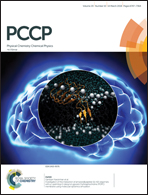Probing different spin states in xylyl radicals and ions
Abstract
Resonant one-color two-photon ionization spectroscopy and mass-selected threshold photoelectron spectroscopy were applied to study the electronic doublet states of the three xylyl (methyl-benzyl) radicals above 3.9 eV as well as the singlet and triplet states of the cations up to 10.5 eV. The experiments are complemented by quantum chemical calculations and Franck–Condon simulations to characterize the transitions and to identify the origin bands, allowing a precise determination of singlet–triplet splittings in the cations. Torsional motions of the methyl group notably affect the D0 → D3 transition of m-xylyl. All other investigated transitions either lead to electronic states with very low rotational barriers or suffer from spectral broadening in excess of methyl torsional energy levels. The methyl internal rotational potential is faithfully reproduced with the most basic ab initio methods, yet hyperconjugation could not be identified as a significant force shaping them. Time-dependent density functional theory describes the excited electronic states better than wave function theory approaches, notably EOM-CCSD.



 Please wait while we load your content...
Please wait while we load your content...